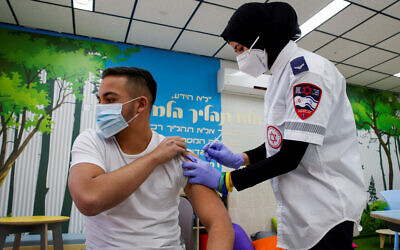Source: Times of Israel
April 11 2020
By Nathan Jeffay
Strain is more effective than original COVID and the British variant at bypassing the shot, Israeli scientists find, in first-of-its-kind, real-world study.
The South African variant of the coronavirus is notably more adept at “breaking through” the Pfizer-BioNTech vaccine than other variants are, Israeli scientists have found, in a first-of-its-kind real-world study.
Israel has used the Pfizer vaccine almost exclusively to vaccinate millions of citizens, with a version by Moderna, based on similar innovative mRNA technology, used minimally.
A team from Tel Aviv University and the Clalit healthcare organization sequenced the swabs of 150 Israelis who tested positive for COVID-19 despite having been vaccinated.
In their study, the prevalence of the South African strain among vaccinated individuals who were infected despite their inoculation was eight times higher than its prevalence in the unvaccinated infected population. Though the number of such infections among the vaccinated was relatively small, the findings indicated that this variant was far more successful in getting through vaccinated individuals’ defenses than other strains.
“Based on patterns in the general population, we would have expected just one case of the South African variant, but we saw eight,” Prof. Adi Stern, who headed the research, told The Times of Israel. “Obviously, this result didn’t make me happy.”
She said that the results show that the South African variant, compared to the original strain and the British variant, “is able to break through the vaccine’s protection.” However, she said that the sample size is too small to put a figure on its increased ability.
“We can say it’s less effective, but more research is needed to establish exactly how much,” she said.

Professor Ran Balicer, head of innovation at Clalit, Israel’s biggest health services provider, in Tel Aviv, on June 10, 2020. (EMMANUEL DUNAND / AFP)
Prof. Ran Balicer, director of research at Clalit, said the study was “very important.”
“It is the first in the world to be based on real-world data, showing that the vaccine is less effective against the South African variant, compared to both the original virus and the British variant,” he said.
Balicer added that the results call for continued vigilance against the coronavirus, including social distancing and wearing masks in indoor spaces, to prevent infection.
“These preliminary findings necessitates close continued attention to the dissemination of this strain in Israel, emphasizing the need for epidemiological monitoring and systematic sequencing, in order to contain further spread of the South African variant in Israel,” he said.
Prof. Ran Balicer, director of research at Clalit, said the study was “very important.”
“It is the first in the world to be based on real-world data, showing that the vaccine is less effective against the South African variant, compared to both the original virus and the British variant,” he said.
Balicer added that the results call for continued vigilance against the coronavirus, including social distancing and wearing masks in indoor spaces, to prevent infection.
“These preliminary findings necessitates close continued attention to the dissemination of this strain in Israel, emphasizing the need for epidemiological monitoring and systematic sequencing, in order to contain further spread of the South African variant in Israel,” he said.

The research, which has been posted online but not yet peer-reviewed, is likely to raise questions about Pfizer’s own real-world study, which found that in South Africa, despite the local strain being prevalent, the vaccine was 100 percent effective.
The Tel Aviv research appears to corroborate a recent study from Ben-Gurion University of the Negev, which found that the vaccine response is less effective against the South African variant. It drew its conclusion by analyzing blood samples, while the new research is based on actual sequenced test results.

Stern emphasized that the South African variant remains uncommon within the vaccinated population, and stressed that the study does not precisely indicate the level of protection against the variant, because its prevalence in Israel is very low – about 1% of all cases.
The study also examined the so-called British variant’s ability to break through the vaccine’s defenses, compared to the original strain. No difference was found in the UK variant’s ability to infect fully vaccinated individuals (after two doses). However, it was more able to infect partially vaccinated individuals than the original.
In Israel, the massive spread of the extra-contagious British variant starting in early January — to the point that it now accounts for more than 90% of COVID cases — is believed to have been responsible for a major wave in the first months of the year, slowing the exit from the pandemic.
But Stern said it may well have had a silver lining: In the battle between variants, the British is far stronger, and may well be keeping the South African at bay.
“It is possible that the extensive spread of the British variant is blocking the spread of the South African variant,” she said. “Because it spread so effectively, it basically didn’t allow the South African variant to spread — it won the competition.”
With more than half the population fully vaccinated, the pandemic is now on the decline, with new daily infections in the low hundreds.


No comments:
Post a Comment